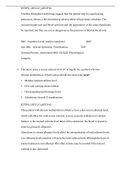Medical surgical nursing, 10th Edition : assessment and management of clinical problems
University of Michigan
All 7 results
Sort by
TEST BANK Fluid, Electrolyte, and Acid-Base Imbalances Lewis: Medical-Surgical Nursing, 10th Edition (COMPLETE QUESTIONS AND ANSWERS)
Intraoperative Care : Test Bank Medical-Surgical Nursing, 10th Edition by lewis
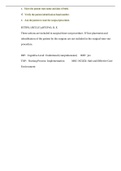
-
Intraoperative Care : Test Bank Medical-Surgical Nursing, 10th Edition by Lewis
- Exam (elaborations) • 3 pages • 2021
- Available in package deal
-
- $12.39
- + learn more
1. On admission of a patient to the postanesthesia care unit (PACU), the blood pressure (BP)is 122/72 mm Hg. Thirty minutes after admission, the BP is 114/62, with a pulse of 74 and warm, dry skin. Which action by the nurse is most appropriate? a. Increase the IV fluid rate. b. Notify the anesthesia care provider (ACP). c. Continue to take vital signs every 15 minutes. d. Administer oxygen therapy at 100% per mask. ANS: C A slight drop in postoperative BP with a normal pulse and warm,...
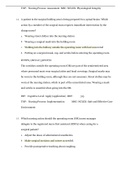
-
Intraoperative Care : Test Bank Medical-Surgical Nursing, 10th Edition by lewis
- Exam (elaborations) • 3 pages • 2021
- Available in package deal
-
- $11.49
- + learn more
A patient in the surgical holding area is being prepared for a spinal fusion. Which action by a member of the surgical team requires immediate intervention by the charge nurse? a. Wearing street clothes into the nursing station b. Wearing a surgical mask into the holding room c. Walking into the hallway outside the operating room with hair uncovered d. Putting on a surgical mask, cap, and scrubs before entering the operating room HTTPS://BIT.LY/3OTCF7O The corridors outside the operati...
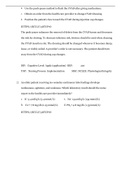
-
Fluid, Electrolyte, and Acid-Base Imbalances Lewis: Test Bank Medical-Surgical Nursing, 10th Edition
- Exam (elaborations) • 3 pages • 2021
- Available in package deal
-
- $12.49
- + learn more
The nurse assesses a patient who has been hospitalized for 2 days. The patient has been receiving normal saline IV at 100 mL/hr, has a nasogastric tube to low suction, and is NPO. Which assessment finding would be a priority for the nurse to report to the health care provider? a. Oral temperature of 100.1°F b. Serum sodium level of 138 mEq/L (138 mmol/L) c. Gradually decreasing level of consciousness (LOC) d. Weight gain of 2 pounds (1 kg) over the admission weight The patient’s ...
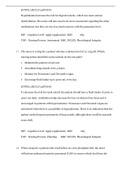
-
Fluid, Electrolyte, and Acid-Base Imbalances Lewis: Test Bank Medical-Surgical Nursing, 10th Edition
- Exam (elaborations) • 3 pages • 2021
- Available in package deal
-
- $11.49
- + learn more
The nurse is caring for a patient who has a calcium level of 12.1 mg/dL. Which nursing action should the nurse include on the care plan? a. Maintain the patient on bed rest. b. Auscultate lung sounds every 4 hours. c. Monitor for Trousseau’s and Chvostek’s signs. d. Encourage fluid intake up to 4000 mL every day. To decrease the risk for renal calculi, the patient should have a fluid intake of 3000 to 4000 mL daily. Ambulation helps decrease the loss of calcium from bone...
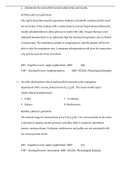
-
Fluid, Electrolyte, and Acid-Base Imbalances Lewis: Test Bank Medical-Surgical Nursing, 10th Edition
- Exam (elaborations) • 3 pages • 2021
- Available in package deal
-
- $13.49
- + learn more
An older adult patient who is malnourished presents to the emergency department with a serum protein level of 5.2 g/dL. The nurse would expect which clinical manifestation? a. Pallor c. Confusion b. Edema d. Restlessness The normal range for total protein is 6.4 to 8.3 g/dL. Low serum protein levels cause a decrease in plasma oncotic pressure and allow fluid to remain in interstitial tissues, causing edema...

Study stress? For sellers on Stuvia, these are actually golden times. KA-CHING! Earn from your study resources too and start uploading now. Discover all about earning on Stuvia

